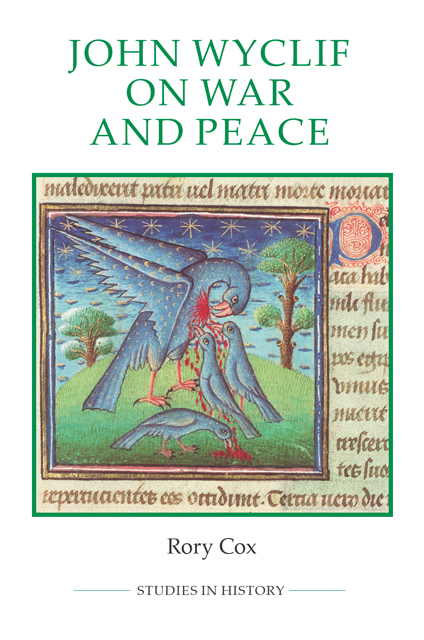Book contents
- Frontmatter
- Dedication
- Contents
- Acknowledgements
- Abbreviations
- A note on the chronology of Wyclif’s Latin works
- Introduction: War, peace and Wyclif
- 1 The development of just war doctrine up to the fourteenth century
- 2 Wyclif’s rejection of just cause
- 3 Wyclif’s rejection of proper authority
- 4 Wyclif’s rejection of correct intention
- 5 Wyclif on politics
- 6 The medieval pacifist
- Conclusion
- Bibliography
- Index
2 - Wyclif’s rejection of just cause
Published online by Cambridge University Press: 24 February 2023
- Frontmatter
- Dedication
- Contents
- Acknowledgements
- Abbreviations
- A note on the chronology of Wyclif’s Latin works
- Introduction: War, peace and Wyclif
- 1 The development of just war doctrine up to the fourteenth century
- 2 Wyclif’s rejection of just cause
- 3 Wyclif’s rejection of proper authority
- 4 Wyclif’s rejection of correct intention
- 5 Wyclif on politics
- 6 The medieval pacifist
- Conclusion
- Bibliography
- Index
Summary
The condition of just cause was not a neatly defined concept in fourteenthcentury just war doctrine. Medieval commentators on war unanimously agreed, however, that just causes for war existed and that the concept of just cause was crucial to the theory and reality of justifiable warfare. What is evident in Wyclif’s treatment of war is a gradual but comprehensive dismantling of the condition of just cause, resulting in the demolition of the first of the foundational pillars of just war doctrine. This alone provides grounds for revising our ideas about Wyclif’s attitude to Christianised violence. The medieval just war was understood to operate on a level of interdependency between the three major conditions of just cause, proper authority and correct intention. If any one of these conditions was not fulfilled, the entire enterprise was rendered unjust. Wyclif’s rejection of the validity of just causes is arguably sufficient in itself to cast serious doubt on the view that Wyclif ultimately defended traditional just war doctrine.
As in all of Wyclif’s thought on war, his examination of injustices and injuries which had traditionally been identified as just causes for violence was not gathered into a single argument in a single chapter, nor was it even gathered into a single treatise. Rather, his criticism of commonly acknowledged just causes for war is evident in a large number of works, although Wyclif gave significant space to discuss these issues in the political treatises De civili dominio and De officio regis. As is often the case, much of his fiercest polemic can be found in his sermons dating from the later years of his life, and it is significant that Wyclif chose to venture into this area of criticism in works that were intended for an extramural audience. To both his academic and non-academic audiences, Wyclif’s theoretical assault on the right of self-defence (both private and public), the protection and restoration of property, and the punitive function of war to avenge injuries, must have appeared radical but also, in a sense, ultra-conservative, grounded as it was in a strictly literal reading of the New Testament and the stipulations of the lex caritatis (law of charity).
Defensive violence
Self-defence would seem to be the most fundamental of all just causes to wage war. In the late medieval period, repelling force with force was seen as a natural right.
- Type
- Chapter
- Information
- John Wyclif on War and Peace , pp. 47 - 72Publisher: Boydell & BrewerPrint publication year: 2014

